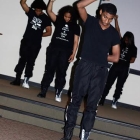Kaitlyn Lewis, Opinion Editor
Some students from Kennesaw State University as well as students from other colleges performed in the Social Sciences Building Thursday, Feb. 19 to celebrate Black History Month on campus.
The event, called “50 Shades of Black”, was hosted by a student organization named TRUST KSU. Junior psychology major Simoine Kenya, TRUST KSU’s founding president, has been planning the event for the past four months, she said.
“I’ve been working on it since November. So it has taken me months,” Kenya said.
“I decided to call the performance ‘50 Shades of Black’ because everything African Americans endure is just another shade of being black,” Kenya said, “black struggle, black triumph, black talent, etc. It’s endless. It’s not necessarily a reference to [the book] 50 Shades of Grey, though that title was clever as well.”
Speakers, poets, singers, rappers and dancers all performed in “50 Shades of Black”; and the famous slogan, “Black Lives Matter”, was often referenced in many of their performances.
The audience was not given many hints or signals of transition throughout the event, and performances flowed from one to the next. Some performances were upbeat, and some were hard-hitting.
Kenya, who also narrated part of the event, warned the audience to be prepare to hear opinions they may not agree with.
Toward the beginning of the event, one student shared a poem that focused much on the recent incidences of violence toward African American citizens.
“Say the name, Trayvon Martin. Say the names, Eric Gardner and Mike Brown,” she said. “This is no longer a poem, it has simply become a journal of a brave girl who has been crippled by fear—fear that a black man’s life won’t mean enough here.”
A step dance team performed throughout the event and shouted, “Hands up, don’t shoot,” during their first performance. One of the dancers also stepped out to give a small speech.
A KSU student and videographer, Tyshawn Smith, showed his a video in between performances, called “Holy Tree”. The video was hard-hitting, and it did not have a happy ending.
“[Holy Tree] was [Smith’s] video project,” Kenya said, “and he decided to do it for Black History…It’s hard to capture our history back in the day when slavery was still prominent and people were getting lynched—and that feeling you get as a slave to try to escape to freedom and have earn your freedom and fight for your freedom…I feel like that’s what he was trying to speak from that video.”
The event also focused much on African American history and highlighted some famous African Americans. Speakers shared stories about W. E. Bois, Nat Turner, a preacher who was hanged for leading a revolt against slavery, Madame C. J. Walker, an entrepreneur and the first female self-made millionaire, Oprah Winfrey, Emmet Till and Rodney King.
Many performances honored the Harlem Renaissance, a period of social, cultural, and artistic explosion that took place between the end of World War I and the 1930s. Student dancers and singers performed in songs that reflected the Harlem Renaissance.
“[The Black History] program exists because it is essential to have progress and showcase our blackness,” Kenya said to the audience, “black talent, black stories, black struggle, black triumph, black history. This is Fifty Shades of Black.”
“I just want people to step up and be proud of being black and embrace it and know why they’re embracing it,” Kenya said. “That was my main message.”


